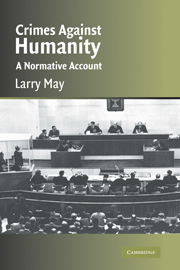1 - Introduction
Published online by Cambridge University Press: 23 November 2009
Summary
Given the inherent costs of criminalization, when a particular legal prohibition oversteps the limit of moral legitimacy, it is itself a serious moral crime.
Joel Feinberg, Harm to Others, p. 4This book provides a philosophical analysis of some of the most difficult issues in international criminal law, most importantly how to justify international interference in one of the traditional prerogatives of a sovereign State – the decisions about whether to engage in criminal punishment of its citizens. International criminal law involves the prosecution of individuals according to international law, often in international tribunals, rather than according to domestic law. The problems of sovereignty that arise are said to be outweighed by the denial of impunity to State leaders and even minor players, who would not normally be prosecuted for serious human rights abuses. The defense of human rights is a powerful weapon used to curtail unbridled State action taken against individuals, thereby promoting global justice. But when we turn to the use of criminal law to protect human rights, we need to focus precisely on what some individuals did to others, and whether those actions met the elements of specific crimes.
Consider the charge of genocide, for example. Genocide is a powerful moral category of rebuke – indeed the most powerfully evocative of all of the current charges in international criminal law. Prosecutions for genocide, especially at the trials in The Hague and Arusha, were very important cultural markers that identified when grave injustice had been committed.
- Type
- Chapter
- Information
- Crimes against HumanityA Normative Account, pp. 3 - 23Publisher: Cambridge University PressPrint publication year: 2004
- 1
- Cited by

